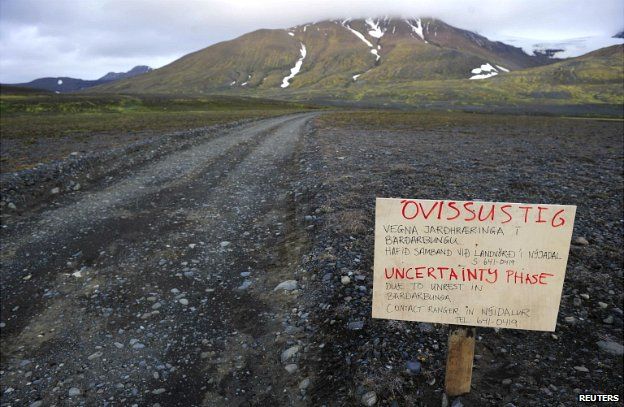Iceland evacuates area near Bardarbunga volcano
- Published

Iceland's authorities have evacuated an area close to the country's Bardarbunga volcano over fears it could erupt.
The area, which is more than 300km (190 miles) from the capital Reykjavik, has no permanent residents but sits within a national park popular with tourists.
The move came as geologists said about 300 earthquakes had been detected in the area since midnight on Tuesday.
Iceland's Eyjafjallajokull volcano erupted in 2010, producing an ash cloud that severely disrupted air travel.
The national civil protection agency said the decision to evacuate more than 300 people close to Bardarbunga was a "precautionary" safety measure.
"It cannot be ruled out that the seismic activity in Bardarbunga could lead to a volcanic eruption," it added.
On Monday, Iceland's meteorological office raised its assessment of the risk level to the aviation industry from yellow to orange.
The orange alert, the fourth level on a five-grade scale, indicates that a volcano is showing "escalating unrest with increased potential of eruption".
The Bardarbunga volcanic system is located under the north-west region of Iceland's Vatnajokull glacier.
Authorities say any eruption in the volcano, which sits under an ice cap, could result in flooding of the area north of the glacier.
The volcano was said to be stable on Wednesday but scientists warned that it is big enough to disrupt air traffic over the Atlantic if an eruption does occur.
The Eyjafjallajokull eruption in April 2010 caused the largest closure of European airspace since World War Two, with losses estimated at between 1.5bn and 2.5bn euros (£1.3-2.2bn).
Criticism following the strictly enforced shutdown resulted in the UK's Civil Aviation Authority relaxing its rules to allow planes to fly in areas with a low density of volcanic ash.
- Published18 August 2014
- Published10 April 2013
- Published9 June 2011
- Published21 April 2010